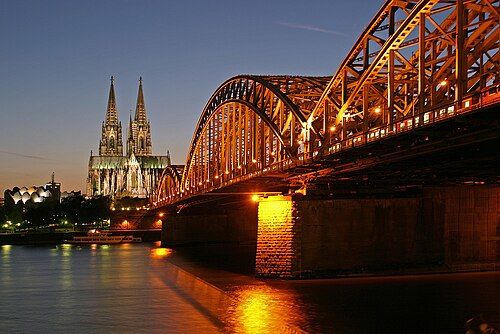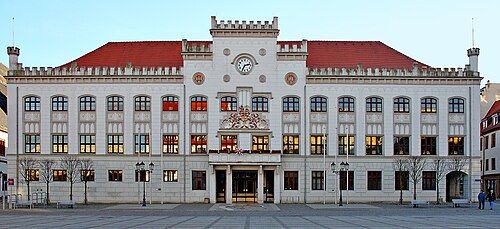Portal:Germany
Welcome to the Germany Portal!
Willkommen im Deutschland-Portal!

|

|
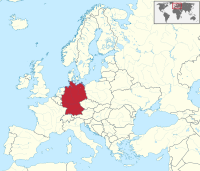
| |
Germany (German: Deutschland), officially the Federal Republic of Germany, is a country in Central and Western Europe, lying between the Baltic and North Sea to the north and the Alps to the south. It borders Denmark to the north, Poland and the Czech Republic to the east, Austria and Switzerland to the south, France to the southwest, and Luxembourg, Belgium and the Netherlands to the west.
Germany includes 16 constituent states, covers an area of 357,578 square kilometres (138,062 sq mi) and has a largely temperate seasonal climate. With nearly 83 million inhabitants, it is the second most populous state of Europe after Russia, the most populous state lying entirely in Europe, as well as the most populous member state of the European Union. Germany is a very decentralized country. Its capital and largest metropolis is Berlin, while Frankfurt serves as its financial capital and has the country's busiest airport.
In 1871, Germany became a nation-state when most of the German states unified into the Prussian-dominated German Empire. After World War I and the Revolution of 1918–19, the empire was replaced by the parliamentary Weimar Republic. The Nazi seizure of power in 1933 led to World War II, and the Holocaust. After the end of World War II in Europe and a period of Allied occupation, two new German states were founded: West Germany, formed from the American, British, and French occupation zones, and East Germany, formed from the western part of the Soviet occupation zone, reduced by the newly established Oder-Neisse line. Following the Revolutions of 1989 that ended communist rule in Central and Eastern Europe, the country was reunified on 3 October 1990.
Today, Germany is a federal parliamentary republic led by a chancellor. It is a great power with a strong economy. The Federal Republic of Germany was a founding member of the European Economic Community in 1957 and the European Union in 1993. Read more...
Selected article
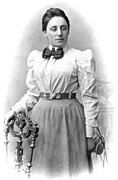
Amalie Emmy Noether (March 23, 1882 – April 14, 1935) was a German Jewish mathematician who is known for her seminal contributions to abstract algebra. Often described as the most important woman in the history of mathematics, she revolutionized the theories of rings, fields, and algebras. She is also known for her contributions to modern theoretical physics, especially for the first Noether's theorem which explains the connection between symmetry and conservation laws.
After completing her dissertation in 1907 under the supervision of Paul Gordan, she worked at the Mathematical Institute of Erlangen without pay for seven years. In 1915, she was invited by David Hilbert and Felix Klein to join the mathematics department at the University of Göttingen. The Philosophical faculty objected, however, and she spent four years lecturing under Hilbert's name. Her Habilitation process was approved in 1919, paving the way for her to obtain the rank of Privatdozent. She remained at Göttingen until 1933, where she was a leading member of a world-renowned center of mathematical research. By the time she delivered a major address at the 1932 International Congress of Mathematicians in Zürich, her algebraic acumen was recognized around the world. The following year, Germany's Nazi government had her fired from Göttingen, and she moved to the United States, where she took a position at Bryn Mawr College in Pennsylvania. In 1935, she underwent surgery for an ovarian cyst and, despite signs of speedy recovery, died four days later at the age of 53. More...
Selected picture
Related portals
- Parent portals
- Regional
- History
 Holy Roman Empire (900–1806)
Holy Roman Empire (900–1806) East Germany (1949–1990)
East Germany (1949–1990)
- Neighbouring countries
Anniversaries for December 29

- 1926 – Death of poet Rainer Maria Rilke
- 1929 – Death of engineer Wilhelm Maybach
Did you know...
- ... that the main cemetery of Mainz was established in 1803 and became the model for the Cimetière du Père-Lachaise in Paris?
- ... that on 26 December 1724 J. S. Bach directed the first performance of Christum wir sollen loben schon, BWV 121, based on a hymn written by Martin Luther in 1524?
- ... that German-born physician Pablo Busch (pictured) was labelled a "witch or curandero" by indigenous tribes in Bolivia?
- ... that Perplexities after Escher, a composition for heckelphone, string quartet and double bass, is based on five graphic artworks by M. C. Escher?
- ... that in addition to millions murdered, Nazi crimes against children included compulsory sterilization, forced labor, forced institutionalization, medical experiments and Germanisation?
- ... that Marie Marcks sarcastically caricatured gender roles like no one before, according to Jutta Limbach?
- ... that Johann Friedrich Hartknoch published the first edition of Immanuel Kant's Critique of Pure Reason?
- ... that during the Second World War the British government transmitted German music to Nazi U-boats?
Selected cuisines, dishes and foods
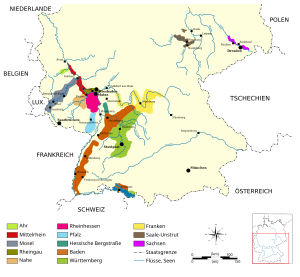
German wine is primarily produced in the west of Germany, along the river Rhine and its tributaries, with the oldest plantations going back to the Roman era. Approximately 60 percent of German wine is produced in the state of Rhineland-Palatinate, where 6 of the 13 regions (Anbaugebiete) for quality wine are situated. Germany has about 103,000 hectares (252,000 acres or 1,030 square kilometers) of vineyard, which is around one tenth of the vineyard surface in Spain, France or Italy. The total wine production is usually around 10 million hectoliters annually, corresponding to 1.3 billion bottles, which places Germany as the eighth-largest wine-producing country in the world. White wine accounts for almost two thirds of the total production.
As a wine country, Germany has a mixed reputation internationally, with some consumers on the export markets associating Germany with the world's most elegant and aromatically pure white wines while other see the country mainly as the source of cheap, mass-market semi-sweet wines such as Liebfraumilch. Among enthusiasts, Germany's reputation is primarily based on wines made from the Riesling grape variety, which at its best is used for aromatic, fruity and elegant white wines that range from very crisp and dry to well-balanced, sweet and of enormous aromatic concentration. While primarily a white wine country, red wine production surged in the 1990s and early 2000s, primarily fuelled by domestic demand, and the proportion of the German vineyards devoted to the cultivation of dark-skinned grape varieties has now stabilized at slightly more than a third of the total surface. For the red wines, Spätburgunder, the domestic name for Pinot noir, is in the lead. (Full article...)Topics
Categories
Things you can do

A list of articles needing cleanup associated with this project is available. See also the tool's wiki page and the index of WikiProjects.
Here are some tasks you can do. Please remove completed tasks from the list.
- Requests: German Archaeological Institute at Rome, Deutsche Familienversicherung, Dietlof von Arnim-Boitzenburg, Rolf von Bargen, Hennes Bender, Georg Bernhard (1875–1944), Eduard Georg von Bethusy-Huc, Rolf Brandt (1886–1953), Jan Philipp Burgard, Lisa Feller, Georg Arbogast von und zu Franckenstein, Georg Gafron, Ferdinand Heribert von Galen, Gundula Gause, Karl-Heinz Hagen, Herbert Helmrich, Nils von der Heyde, Monty Jacobs (1875–1945), Hans Katzer, Siegfried Kauder, Matze Knop, Wolfgang Kryszohn, Claus Larass, Isidor Levy (1852–1929), Markus Löning, Tobias Mann, Mathias Müller von Blumencron ,Günther Nonnenmacher Anke Plättner, Hans Heinrich X. Fürst von Pless, Gerd Poppe, Victor-Emanuel Preusker, Günter Prinz, Ulrich Reitz, Hans Sauer (inventor), Franz August Schenk von Stauffenberg, Paul Schlesinger (1878-1928),Oscar Schneider, Hajo Schumacher, Otto Theodor von Seydewitz, Christoph Sieber (comedian), Dorothea Siems, Werner Sonne, Udo zu Stolberg-Wernigerode, Christoph Strässer, Joseph von Utzschneider, Jürgen Wieshoff, Hans Wilhelmi, Dietmar Wischmeyer, Alexandra Würzbach
- Unreferenced: Unreferenced BLPs, Bundesautobahn 93, Benjamin Trinks, Steeler (German band), Amelie Beese, Zoologisches Museum in Kiel, Emil Krebs, Prussian semaphore system, Partenstein, Peter Krieg, Porsche 597, Christa Bauch, Curt Cress, Stefan Beuse
- Cleanup: 53541 issues in total as of 2024-03-03
- Translate: Articles needing translation from German Wikipedia
- Stubs: Albersdorf, Thuringia, Ingo Friedrich, Berndt Seite, Federal Social Court; 117 articles in Category:German MEP stubs
- Update: Deutsches Wörterbuch
- Portal maintenance: Update News, Did you know, announcements and the todo list
- Orphans:
Orphaned articles in Germany

- Photo: Take/Add requested photographs
- Help assess the quality of 944 unassessed articles
Associated Wikimedia
The following Wikimedia Foundation sister projects provide more on this subject:
-
Commons
Free media repository -
Wikibooks
Free textbooks and manuals -
Wikidata
Free knowledge base -
Wikinews
Free-content news -
Wikiquote
Collection of quotations -
Wikisource
Free-content library -
Wikiversity
Free learning tools -
Wikivoyage
Free travel guide -
Wiktionary
Dictionary and thesaurus



